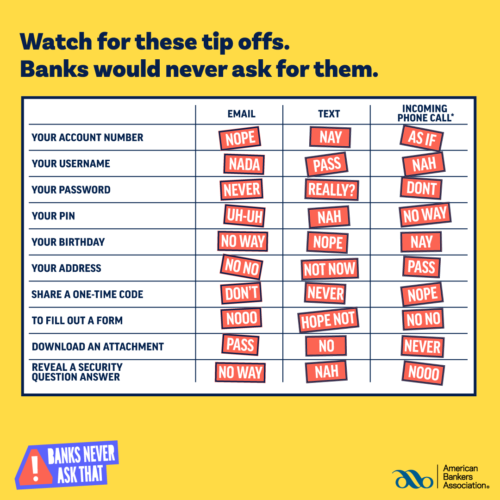Posted October 1, 2021 in Blue Springs, Banking Tips, Lifestyle, Banking Updates, Rushville, Overton, Merriman, Martin, Harrison, Cody, Clatonia, Sidney, Thedford, Crawford, Cozad, Hay Springs, Rapid City, Elwood, Valentine, Beatrice, Lincoln
Cybersecurity Awareness

October is Cybersecurity Awareness Month. Every day, thousands of people fall victim to fraudulent emails, texts and calls from scammers pretending to be their bank. And in this time of expanded use of online banking, the problem is only growing worse. In fact, the Federal Trade Commission’s report on fraud estimates that American consumers lost a staggering $3.3 billion to these phishing schemes and other fraud in 2020 — up 83% from 2019.
It’s time to put scammers in their place Online scams aren’t so scary when you know what to look for. And at Security First Bank we’re committed to helping you spot them as an extra layer of protection for your account. We’ve joined with the American Bankers Association and banks across the country in a nationwide effort to fight phishing—one scam at a time. We want every bank customer to become a pro at spotting a phishing scam—and stop bank impostors in their tracks. It starts with these four words: Banks Never Ask That. Because when you know what sounds suspicious, you’ll be less likely to be fooled.
These top 3 phishing scams are full of red flags:
- Text Message: If you receive a text message from someone claiming to be your bank asking you to sign in, or offer up your personal information, it’s a scam. Banks never ask that.
- Email: Watch out for emails that ask you to click a suspicious link or provide personal information. The sender may claim to be someone from you bank, but it’s a scam. Banks never ask that.
- Phone Call: Would your bank ever call you to verify your account number? No! Banks never ask that. If you’re ever in doubt that the caller is legitimate, just hang up and call the bank directly at a number you trust, or the number listed on the back of your debit card.
You’ve probably seen some of these scams before. But that doesn’t stop a scammer from trying. For more tips on how to keep phishing criminals at bay, including videos, an interactive quiz and more, visit www.BanksNeverAskThat.com.
What to do if you fall for a scam text, email or call:
- Contact your bank and creditors. Speak with the fraud department and explain that someone has stolen your identity.
- Request to close or freeze any accounts that may have been tampered with or fraudulently established and place a fraud alert on your credit by contacting one of the three credit bureaus.
- Make sure to change your online login credentials, passwords and PINs and implement a multi-factor authentication.